
Eupithecia tantillaria, the dwarf pug, is a moth of the family Geometridae. It was described by Jean Baptiste Boisduval in 1840. The species can be found in the Palearctic realm.

Eupithecia tripunctaria, the white-spotted pug, is a moth of the family Geometridae. The species can be found from Europe to Korea and Japan and in North America.
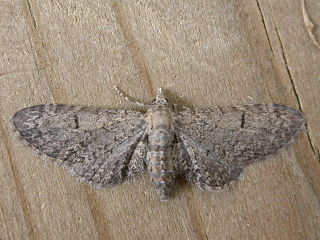
Eupithecia ultimaria, the Channel Islands pug, is a moth of the family Geometridae. The species was first described by Jean Baptiste Boisduval in 1840. It can be found in Europe, where it is found in Portugal and Spain, coastal western and southern France, Italy, the Mediterranean islands including Cyprus and Greece. It is also found in southern England and the Channel Islands. Furthermore, it is present in North Africa, Lebanon, Israel, Iraq and Iran.

Eupithecia actaeata is a Eurasian species of moth of the family Geometridae.

Eupithecia distinctaria, the thyme pug, is a moth of the family Geometridae. It is found throughout Europe. It is also found in Iran. from the Iberian Peninsula through western and central Europe including the British Isles as well as further east as far east as far as Russia and Iran. In the north the range reaches as far as the southern Fennoscandia, to the south, where it is more common, it occupies the Mediterranean and Asia Minor. It is found primarily on warm, stony slopes and rocky structures as well as on sparse grassy areas with thyme mounds. In the Alps, it rises to heights of 2000 metres.

Eupithecia minusculata is a moth in the family Geometridae. It is a widespread species, ranging from Spain through North Africa and the Middle East to Mongolia. In the north, the range extends to the lower part of the River Volga. In Central Asia, it is found in Turkmenistan, Uzbekistan, Tajikistan, Afghanistan, southern Kazakhstan, and north-western China (Xinjiang). The habitat consists of deserts or xerophilous areas.
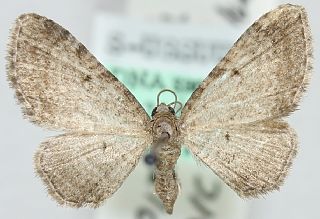
Eupithecia addictata is a moth in the family Geometridae. It is found from north-eastern Italy, through Austria, northern Hungary and southern Slovakia to Ukraine, Russia and Japan. It is also found in the southern Balkan Peninsula.

Eupithecia silenicolata is a moth in the family Geometridae. It is found from southern Europe and Morocco to western Asia, Iran and Pakistan. In the north, the range extends to southern Switzerland, Austria and northern Italy.
Eupithecia catalinata is a moth in the family Geometridae first described by James Halliday McDunnough in 1944. It is found in the southern United States, including Utah, Arizona and New Mexico.

Eupithecia ericeata is a moth in the family Geometridae first described by Jules Pierre Rambur in 1833. It is found in most of southern Europe and the Near East.
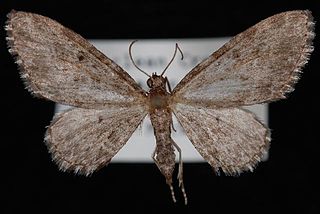
Eupithecia lachrymosa is a moth in the family Geometridae first described by George Duryea Hulst in 1900. It is found in North America from central Saskatchewan west to southern Vancouver Island, north to British Columbia and Alberta and south to California.

Eupithecia niveifascia is a moth in the family Geometridae first described by George Duryea Hulst in 1898. It is found in North America from south-western Alberta west to Vancouver Island, north to northern coastal British Columbia and south to New Mexico.
Eupithecia hohokamae is a moth in the family Geometridae first described by Frederick H. Rindge in 1963. It is found in the United States in southern Arizona and California.
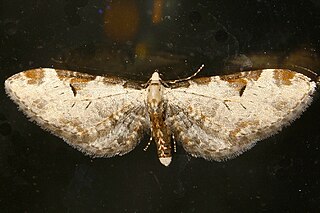
Eupithecia nevadata is a moth in the family Geometridae first described by Alpheus Spring Packard in 1871. It is found in western North America.
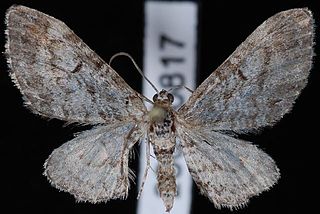
Eupithecia graefi, or Graef's pug, is a moth in the family Geometridae. The species was first described by George Duryea Hulst in 1896. It is found in North America from south-western Alberta west to Vancouver Island, north to Alaska and south to California. The habitat consists of wooded areas.
Eupithecia macrocarpata is a moth in the family Geometridae first described by James Halliday McDunnough in 1944. It is found in the US state of California.

Eupithecia misturata is a moth in the family Geometridae first described by George Duryea Hulst in 1896. It is widely distributed in western North America.

Eupithecia rotundopuncta is a moth in the family Geometridae first described by Alpheus Spring Packard in 1871. It is found in western North America from Arizona to the Pacific coast, north to Vancouver Island in British Columbia.

Eupithecia unedonata is a moth in the family Geometridae. It is found in Spain, France, Italy, Corsica, Sardinia, Sicily, Malta, Greece, Crete, Rhodes, North Africa, Israel, Lebanon, Turkey and Transcaucasia.
Eupithecia shirleyata is a moth in the family Geometridae first described by Samuel E. Cassino and Louis W. Swett in 1922. It is found in the US in southern California and Arizona.















